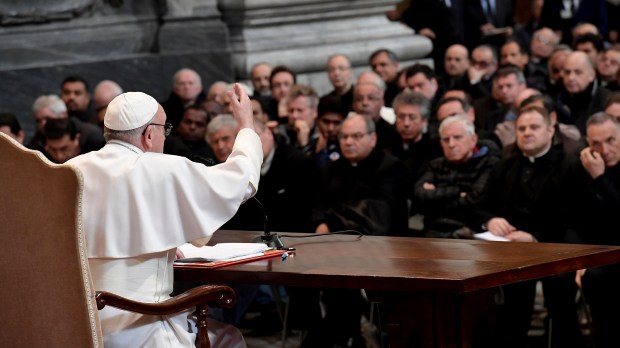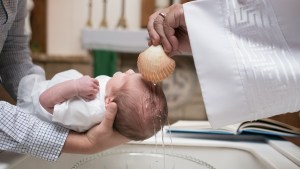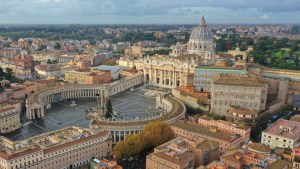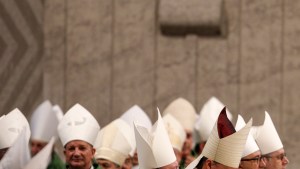Led by Cardinal Marc Ouellet, prefect of the Congregation for Bishops, the Vatican is hosting a major symposium on the priesthood February 17-19, 2022. Announced almost a year ago, this symposium, which will be opened by Pope Francis, aims to return to the fundamentals of the priesthood in a moment of crisis for priestly identity and certain voices questioning priestly celibacy.
This is the first time since the beginning of the pandemic that such a big colloquium has been organized at the Vatican. “Cardinal Ouellet arranged for it to be held inside the Vatican, in the large Paul VI Hall. It’s a sign,” says a priest who believes that Rome is looking favorably on the symposium, which is expected to bring together some 500 participants, mainly priests and bishops.
The idea of this theological reflection on the priesthood was born after the Synod on Youth and the Synod on the Amazon in 2019. The latter revealed sharp tensions within the Church itself, particularly on the question of the ordination of certain married men to assist with ministry in the vast regions of the Amazon. The issue was voted on by the Synod Fathers but not mentioned by Pope Francis in his post-synodal exhortation.
In his book A Time for Change [1], Pope Francis spoke of the “media narrative” surrounding this synod, which ended up “undermining the capacity for discernment.” For Father Vincent Siret, rector of the French Pontifical Seminary in Rome, the symposium’s objective is to “take up things in a fundamental way.”
“When we come up against questions that become ideological and political, we have to go deeper, to take up the theological work at the base,” explains Father Siret, who was part of the small team that worked on the symposium’s program. “This is the objective of these three days,” he continued, but added: “I will disappoint you: there will probably not be many concrete answers to the most ‘burning’ questions that agitate the media.”
Cardinal Ouellet expressed the same sentiment: “We are not unaware of what is being said about the celibacy of priests. But the symposium is a fundamental reflection. It was not designed to answer all the questions that are in the media or to respond to what is happening in Germany.”
The symposium is taking place as a German synod enters its final phase. Since 2019, the Church in Germany has been in the midst of a synodal process to respond in particular to the crisis of sexual abuse among the clergy. Debates have brought forward proposals advocating for the end of priestly celibacy and for the ordination of women. Very recently, one of the heavyweights of the German episcopate, Cardinal Reinhard Marx, spoke out in favor of lifting the obligation of celibacy for priests.
These positions run counter to those of Cardinal Ouellet. “A Church ‘in decline’ would not benefit, in my opinion, from reducing the requirements of the priesthood in the name of regional, cultural, and pastoral imperatives,” he wrote recently. [2] Regarding the German synod, the prefect of the Congregation for Bishops sent a letter in 2019 to Cardinal Marx, then president of the German Bishops’ Conference, in which he expressed reservations about a synodal process whose conclusions would affect not only the Church in Germany but the universal Church.
But Cardinal Ouellet assures us today that it is not a question of challenging or commenting during the symposium on the discussions of the Church in one country. Noting that German bishops will be present, he simply confided: “If what they hear there can be useful for their reflections, I would be happy.”
The baptismal priesthood is not a cheap priesthood!
Beyond the question of celibacy, the organizers of the symposium especially want their discussions to assist the synodal process launched by Pope Francis in October 2021 throughout the Catholic Church. Through the Synod on Synodality, the Argentine Pope has said he wants to revive the participation of the entire “People of God” in the life of the Church. One of the objectives of this two-year reflection is to make all the baptized aware that the Church’s mission is not reserved only for ordained ministers, and to draw out the consequences of this on the way of living in Church.
“When we speak of priesthood, we must understand both the baptismal priesthood – common to all Catholics – and the priestly ministry of priests and bishops,” explains Father Siret. He reminds us that “the baptismal priesthood is certainly not a cheap priesthood!”
Father Siret continues, “Whether one is poor, rich, a priest or a lay person, we are all called to follow Christ. I hope that this symposium, which is taking place 60 years after Vatican II, will contribute to giving elements on the right way to exercise our common priesthood in a missionary spirit.”
In his introductory speech, Pope Francis could speak about the articulation between the two priesthoods and warn again against clericalism. “Clericalism forgets that the visibility and sacramentality of the Church belong to the whole People of God, not just to a chosen few and enlightened people,” he insisted, for example, in a 2016 letter to Cardinal Ouellet as part of his presidency of the Pontifical Commission for Latin America.
In a context of crisis of the identity of the priest and of profound reflections on the effective participation of all the baptized in the “priestly function” – as the preparatory text of the Synod on synodality reminds us – the inaugural speech of the head of the Catholic Church will likely be particularly scrutinized.
~
[1] A time for change, Éditions. Flammarion, 2020.
[2] Friends of the Spouse, Éditions Parole et Silence, 2019.




